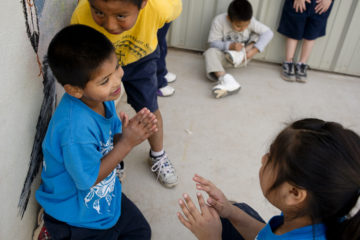On this Twenty-third Sunday of Ordinary Time, the Scripture guides us in our relationships with others. Fr. Paul Gallagher, OFM directs us to pray with a gospel heart. The reflection and questions are edited by Franciscan Sister of Christian Charity Sister Anne Marie Lom and Joe Thiel. The excerpts from the Sunday readings are prepared by Joe Thiel. To read or download the complete pdf with excerpts for your prayer, please click here: Franciscan Gospel Reflection September 6 2020. Excerpts are from the Lectionary for Mass for Use in the Dioceses of the United States of America, second typical edition © 2001, 1998, 1997, 1986, 1970 Confraternity of Christian Doctrine, Inc., Washington, DC. Used with permission. All rights reserved. No portion of this text may be reproduced by any means without permission in writing from the copyright owner. (Photos: Priscilla Thomas)
Mt 18:15-20
Jesus said to the disciples, “If your brother sins against you, go and tell him his fault between you and him alone. If he listens to you, you have won over your brother. If he does not listen, take one or two others along with you, so that ‘every fact may be established on the testimony of two or three witnesses.’ If he refuses to listen to them, tell the church. If he refuses to listen even to the church, then treat him as you would a Gentile or a tax collector.
Amen, I say to you, whatever you bind on earth shall be bound in heaven, and whatever you loose on earth shall be loosed in heaven. Again, amen, I say to you, if two of you agree on earth about anything for which they are to pray, it shall be granted to them by my heavenly Father. For where two or three are gathered together in my name, there am I in the midst of them.”
Background:
For the past two weeks, the gospels have focused on a turning point in Matthew’s gospel: Peter’s declaration that Jesus was the messiah. This was a turning point for both Jesus and for the disciples. Two weeks ago, Jesus asked the disciples who they believed that he was. Peter spoke up saying, “You are the Christ, the Son of the living God.” (Matthew 16:16) Last week, Jesus told the disciples that because of his role as Messiah, he would undergo suffering, rejection, and death. Peter again spoke up and expressed his hope that Jesus would be spared such a fate. After Peter expressed this concern and hope for Jesus, Jesus further instructed the disciples that they too must be willing to lose their lives. Last week’s text brought us to the end of the 16th chapter of Matthew’s gospel.
The gospel for this week is taken from the 18th chapter of Matthew’s text. The church, in choosing this text for our reflection, has passed over the entire 17th chapter and the first 14 verses of the 18th chapter. If time permits, it may be helpful to read through those verses. For those who do not have the opportunity to read the text that is skipped in the Sunday Lectionary, here is a list of the events that Matthew describes in those verses:
- The Transfiguration of Jesus
- Jesus’ instruction regarding the coming of Elijah
- The healing of a boy who is possessed by a demon
- A second prediction of Jesus’ suffering and death
- Jesus being questioned about paying the temple tax
- Jesus teaching the disciples that the greatest in the realm of God is like a little child
- A stern warning to those who would lead a child into sin
- The parable of the lost sheep
The last two teachings draw attention to Jesus’ concern for the lost. They provide the backdrop for the instruction to the disciples that makes up the gospel for this week.
Jesus lived in a culture where allegiance to family and honor were deeply-held values. In that society, conflict could easily escalate into violence. Therefore, there was a need to deal with any conflict that might arise as quickly and privately as possible. Once a transgression reached the public forum, it became a matter of honor for one to either demand restitution or inflict similar or greater damage. The private social system worked in way that reached out in compassion, in a way that did not draw attention or embarrassment to the person who felt they had been offended.
Jesus’ instruction puts the responsibility for taking the initial action on the one who believed they were offended. The hope is to restore the relationship, and the focus is on avoiding violence that can be passed on from one generation to the next.
When disagreements became public, those disagreements were not settled by logic, evidence, or a convincing line of reasoning. Rather, the more persuasive argument was the one made by the person whose supporters were more numerous and held greater esteem within the community. If the private and personal approach didn’t resolve the issue, one resorted to the other public avenues. If that was unsuccessful, the person lost their relationship with the community. They were treated as a non-member of the community or as a traitor.
The second part of the gospel stresses the responsibility that the community played in reaching out to the lost and alienated of the community. What was bound on earth by those disciples of Jesus was bound in heaven. Those who failed to maintain their relationship, or refused to be reconciled, would also find it so in heaven. The text itself does not indicate that this admonition is meant just for the apostles or for those who exercise roles of leadership. Jesus is addressing all of the disciples.
Reflection Questions:
- Do you remember times when you felt offended by something another said or did? Are you able to recall the details of what happened? Can you recall how it impacted the relationship?
- Have you ever been part of a situation where families or a portion of a community were permanently divided over something that took place?
- Can you also recall times of forgiveness and reconciliation in your life?
- Are you more likely to shrug off a hurtful incident, quietly walk away offended to tell someone who will be sympathetic, alter your relationship without any discussion, or…?
- To what extent have you reached out to another to save a relationship?
- Can you talk with God now as one who will listen attentively to whatever thoughts or feelings this gospel brings to the fore for you?




